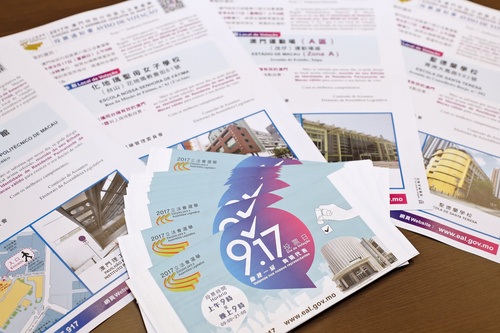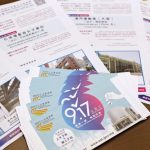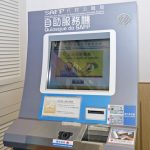 The Electoral Affairs Commission for the Legislative Assembly Election is to send out starting from this week poll notices to voters.
The Electoral Affairs Commission for the Legislative Assembly Election is to send out starting from this week poll notices to voters.
The Electoral Affairs Commission for the Legislative Assembly Election is to send out – starting this week – notices to inform voters about the polling station where they can vote on election day, set for 17 September.
The Chairman of the Commission, Mr Tong Hio Fong, today reminded voters that did not provide an update of their address could not assume they would be asked to cast their vote at the same polling venue they used for the 2013 election. He urged voters to pay close attention to the poll notice.
Voters who do not receive the notice can request their polling station details by any of the following methods: contacting a 24-hour telephone hotline launched today (+853 2891 7917); visiting any of the self-service kiosks of the Public Administration and Civil Service Bureau or of the Identification Services Bureau; or visiting the Election Information Centre at the Public Administration Building.
Mr Tong made the comments after a meeting with the General Audit Committee of the Legislative Assembly Election to discuss the criteria for determining the validity of ballots. Both sides already had reached a basic consensus on the matter, he said.
Mr Tong additionally said the Commission would make available a total of 23 public venues featuring notice boards for candidate teams to post their election materials during the official campaigning period. A total of 19 public venues would be made available for teams to conduct promotional activities. The two numbers have both increased by three, respectively, compared to the 2013 Legislative Assembly Election process.
The Commission expects to conduct a draw next week to determine the order in which teams will be allowed to use the public venues to conduct their respective promotional activities.
Meanwhile, Mr Tong clarified that candidates were not completely barred from making public comments during the non-campaigning period. The rules did not ban candidates – as normal citizens – from holding discussions on livelihood issues.
The Legislative Assembly Election Law banned teams from conducting promotional activities during the non-campaign period; i.e. candidates were not allowed to publish materials or to hold public discussions on their respective electoral manifestos in order to get voter support.
Promotional activities referred to activities aiming to capture the attention of the public, explained Mr Tong. It was prohibited for candidates or other people to publicly share information about any of the candidate teams – including using public social media accounts – during the non-campaign period. Private discussions between friends on such topics were not affected, he added.
During the non-campaign period, candidates should set all election-related posts published on social media platforms as “non-public”, the Commission advised. This would ensure the content was not available to the public, therefore complying with Article 75-A of the Legislative Assembly Election Law.
Mr Tong said the campaign period – restricted to two weeks as stated in the Legislative Assembly Election Law – aimed to provide an equal opportunity for all teams to campaign and promote their electoral manifestos. The campaign period did not aim – contrary to what was suggested by some comments – to benefit any team that eventually had more resources.
The non-campaign period runs from 3 August to 1 September inclusive. The official campaign period runs from 2 to 15 September.
View gallery


